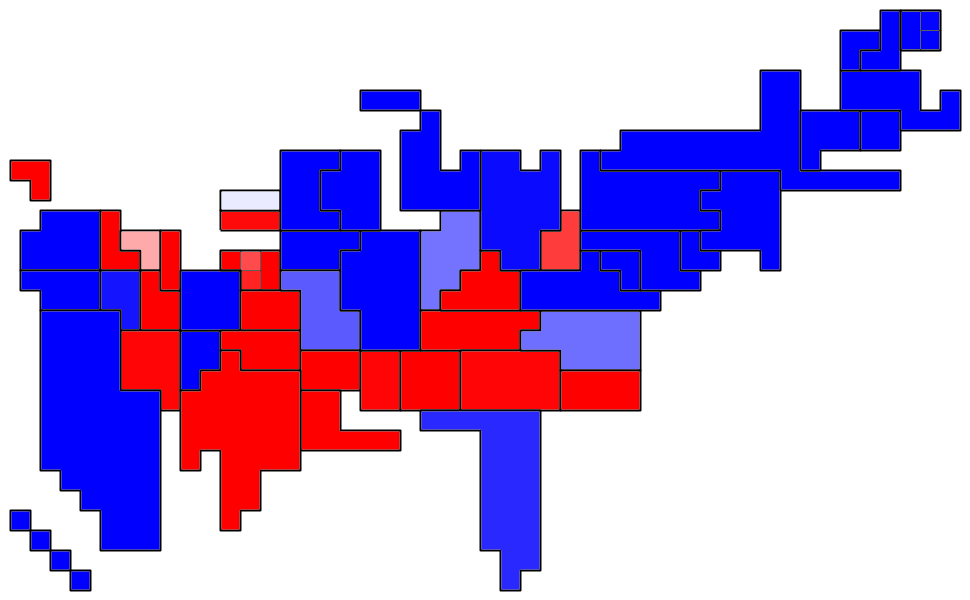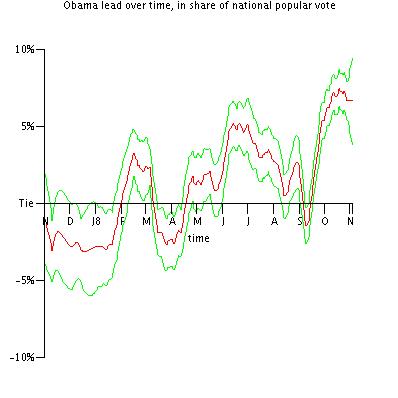Where Does Your Vote Count?
Yesterday I tackled the question "Given current data, which states are likely to affect the election the most?" Now I ask the question "In which state does a single vote matter the most?"
I've always heard that the likelihood of a single voter swinging a state election is inversely proportional to the square root of the state's population. I understand quite well the underlying mathematical assumptions behind this idea. However, the real story is somewhat more complicated, and the right formula involves not the square root of the population, but the population itself. I'll right about this some other time. For now though, given the current data, the list of states by ability of a single voter to influence the election is as follows (don't worry too much about the units associated with these numbers, and don't put too much stock in the ranking towards the bottom of the list):
West Virginia, 30.8;
Arkansas, 21;
Nevada, 16;
Missouri, 11;
New Hampshire, 10;
Ohio, 9.9;
Wisconsin, 8.5;
Florida, 5.5;
Virginia, 4.7;
New Mexico, 4.5;
Arizona, 4.4;
Colorado, 3.3;
Michigan, 3.2;
Oregon, 2.3;
Pennsylvania, 1.8;
Iowa, 1.4;
North Carolina, 1.4;
Maine (2nd), 1.4;
Nebraska (2nd), 0.95;
Minnesota, 0.72;
others, <0.5.
Conclusion: If you don't mind moving to West Virginia or Arkansas, go do that now.



10 Comments:
Dude! or wisconsin! 88.5???!! now i'm curious about the units ...
-nori
Sorry for getting your hopes up, Nori, but that's a typo. It should have read 8.5 and is being corrected. But it's still much higher than DC.
The units... Divide these numbers by 100,000 and you get (my best guess of) the correlation coefficient between the national result and the vote of a voter who flips a fair coin to decide his vote. A correlation of 1 would mean that the entire election is completely in that voter's hands; a correlation of 0 would mean that that voter doesn't matter at all. Since even a West Virginia voter has a correlation of just 0.000308, a single vote doesn't matter much, which most folks knew anyhow.
But everyone should still vote! Even if you're in DC or Utah, your influence on the election is infinitely times greater than if you don't vote at all.
Okay, so Wisconsin's new 8.5 / 100,000 = 0.000085, yes? which is LESS than west VA? oh, WEST ... gotcha.
but still -- maybe i'm missing something here, but even your map seems to show that wisconsin is more swing than west virginia. does the state's swing-ness have nothing to do with the odds that a single voter will influence the way the state goes? i would think (intuitively, not mathematically) that they'd be correlated, because if the state's too close to call, that means a small percentage of the population would be effectively deciding the outcome. but i guess the single voter has to be assumed to come from anywhere in the state, not just the swing bit, eh?
and, fwiw, i'm registered in WI. not intending to change that until DC gets its due representation, which will be, um, never ...
-n
A few things here. First, West Virginia and Wisconsin have precisely the same degree of shading (8% saturation and 100% brightness of red and blue respectively indicating that Bush has a 54.06% chance of winning WV and Kerry has a 54.04% chance of winning WI) on the relevant map; in fact, they currently have the same degree of shading on every map. You may have perfect pitch, but I think your eyes are playing tricks on you.
Considered as whole states, Wisconsin is more of a swing state than West Virginia (at least right now) because it has more electoral votes. (In fact, the difference in swinginess isn't as much as you might expect, because the election is quite likely to be so close that either 10 or 5 electors could swing the national result. See the "Swingers" post of 7/4/04.) However, for an individual in WI or WV to swing the national vote, there would have to be a perfect tie in WI or WV; because WI has about 3.9 times more voters than WV, this is much less likely to happen in WI, so a single West Virginian's vote is more likely to swing the national election than the vote of his Wisconsinite friend.
Why does WI have four times as many voters as WV but only twice the electoral votes? First off, because both states get two electors from their portion of the Senate. But even so, WI has only 2.67 times as many representatives than WV despite having 4 times as many voters. The reason is that WI has a much higher voting rate (68% in 2000, tying with MN for 3rd place) than WV (52%, 40th). Of course, even though a West Virginian voter is worth more than a Wisconsinite voter, the campaigns may rationally focus more on Wisconsin, since a TV ad can reach more Wisconsinites simultaneously than West Virginians.
The most obvious solution is to apportion electors based on actual election night numbers of voters instead of census population; however, this is an extraordinarily bad idea for a number of reasons.
Hope that answers all your questions.
Could you redo these calculations based on more recent data? (If you have time--it's just a curiosity, since I'm definitely voting in PA and I know my presidential vote is worth more in PA than NY.)
--Viva
Great article! Thanks.
Thanks for interesting article.
Nice! Nice site! Good resources here. I will bookmark!
I see first time your site guys. I like you :)
Excellent website. Good work. Very useful. I will bookmark!
Post a Comment
<< Home